What roles do the youth and the public have in the fight against climate change? This question was a running theme through COP26 as young activists continued to demand their voice to be heard and demand for climate justice to be realised. Our team at the Centre for Climate Justice joined in support of the Fridays for Future march in Finnieston, as well as attended COP26’s themed day on youth.
The march left from Kelvingrove Park and headed towards George Square, passing directly by the SEC where many world leaders, politicians and those in positions of power were negotiating behind closed doors. Amongst a heavy police presence, a large, peaceful crowd of around 25,000 people gathered. Many youth activists have been actively striking over the past three years in attempts to draw attention to the wide-ranging climate issues and to hold politicians accountable. The rally was led by Amazonian Youth from Ecuador and Brazil but there was criticism across social media that news coverage failed to provide airtime to these groups despite them being on the frontline of climate change. Scotland’s Dylan Hamilton hosted the rally and addressed the crowds alongside Vanessa Nakate from Uganda, and Indigenous Youth from all over the world. Greta Thunberg, was also present. One of the Centre’s staff members, Eilidh Watson, interviewed Greta back in 2019 and since this time, the message from youth has not changed: “We need action now.” Yet, despite an apparent lack of ambitious action by world leaders, this message has over the years gained momentum thanks, in large part, to youth activism. Young people do not wish to be striking about climate change issues, but they see the adults in positions of power as failing to make serious change. Many feel they are left with no other choice but to bring attention to these issues themselves. There are climate justice issues entrenched in this. Why should it be down to the youth who have done little, if anything, to contribute to climate change, yet feel scared and worried for the future? Moreover, with growing physical and mental health issues associated with climate change, this lack of climate action will have inter-generational justice implications. It is today’s youth that will be left to deal with the current, short term thinking and lack of action by the world’s most powerful.
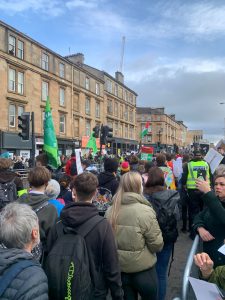
There was considerable criticism from across the youth movement for allocating the COP26 theme of ‘Youth’ to be held on a Friday. It is well known that the Fridays for Future strikes have taken place every Friday across the world for the past 167 weeks. Was this a sign of poor planning on the part of the COP team or an effort to silence youth voices, as some activists suggest? Or, on the contrary, was it an attempt to engage with youth on a day that the COP team believed that they would already be missing school to march in Glasgow? It is unclear, but the (relatively few) young people that had access to the Blue Zone were forced to choose between standing in solidarity with the movement and connecting with international youth activists from all over the world at the march or attending the COP with adults who have a history of not listening to, patronising or dismissing young people and refraining from accepting their responsibility for the crisis. Even, a speech by President Barack Obama addressed to the youth of the world, was shut off from the few young delegates and activists at COP26. The event was extremely restricted with few tickets to attend – of which found their way to senior heads of delegations – and left most young delegates, whom the speech was largely addressed to, watching on their phones a few metres from the entrance. It seems to have been a crucial missed opportunity by the COP Presidency to pursue meaningful engagement with youth on climate justice issues.

Friday’s strike was followed by a march during the Global Day of Action for Climate Justice on Saturday, during which an estimated 120,000 people assembled in what is believed to be one of the biggest gatherings for Climate Justice to-date, with many others joining in action and protest around the world. Michael Mikulewicz, Sennan Mattar and Karin Helwig from the team at the Centre for Climate Justice joined in the march from Kelvingrove Park to Glasgow Green. Despite the cold, windy and rainy weather every step of the march, spirits were high with activist’s hopeful for a meaningful deal at COP26 and encouraged by the sense of global solidarity that permeated the multi-cultural crowd. Centre staff marched alongside the Pan-Africa Climate Justice Alliance (PACJA) at the front of the march – and joined their calls for climate justice for Africa. PACJA have been campaigning hard for Africa to be recognised as a region of special circumstance and needs as the continent, despite contributing little to it, is most affected by climate change. The focus on the youth is incredibly relevant in Africa as 41% of the African population is under 15 years; a failure to prevent dangerous levels of climate change will place an unjust and deadly burden on the youth of Africa in the decades to come.
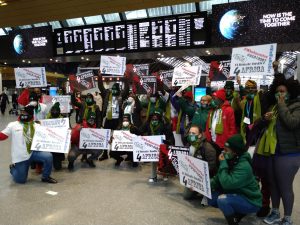
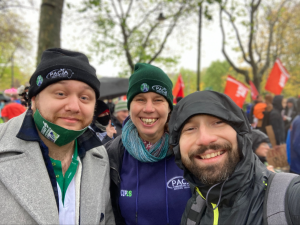
Inside the Blue Zone at COP26 on Friday, the mood was slightly different and less energetic compared to that in the streets outside. In the afternoon, Eilidh Watson attended a Presidency event entitled: The power of public engagement for harnessing climate action: Stories and lessons of empowerment from around the world. The audience heard from panellists that included Darren Jones MP, Chair of the department for Business, Energy and Industrial Strategy in the house of commons, John Ryley, Head of Sky News, Harjeet Singh from Climate Action Network, Usfath Ibrahim, Presidential Special Envoy on Climate Change for the Maldives, and Lydia Dai from YOUNGO, the youth constituency of the UNFCCC. They each shared their perspectives on the importance of public engagement to communicate climate change science. Darren Jones highlighted the successes of the Climate Change Citizens’ Assembly in UK as a tool to engage and educate citizens about climate change and inform them about individual actions they can take in order to be part of the solution. However, the promotion of individual actions to tackle climate change seems to be at odds with the reality of climate change. Whilst individual actions and efforts to tackle climate change should not be diminished, it is important to note that the richest 10% of the world’s population are responsible for around half of the world’s emissions whilst the poorest 50% produce less than 1 tenth (as reported in this Oxfam report). This statistic clearly demonstrates that those responsible for a disproportionate bulk of emissions are the ones who also have the financial means to fund climate action.
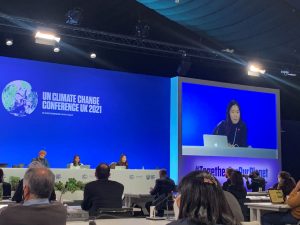
This is something that was highlighted by Usfath Ibrahim who said that those impacted by climate change must lead the narrative surrounding it, and that “Rich countries need to listen and act”. While individual actions are important and all add up towards our common goal of addressing climate change, there is a danger that the focus and responsibility could be shifted towards the individual and taken away from those in positions of power who often seem to prioritise the bottom line over human life. The phrase “We don’t need a handful of people living perfect, climate-conscious lifestyles – we need millions of people doing it imperfectly” rings true to the collective action that is needed, but only alongside the changed required from major contributors to the climate crisis, who should accept their fair share of responsibility.
While many delegations and parities referred to the youth, the vast majority of meaningful conversations on the role of the young and next generations was found outside of the COP26 venue. Issues of access, representation and meaningful engagement were a running theme of COP26. However, the young activists at COP26 summed up their disappointment when the Youth NGO delegation lamented that most parties had already left the venue at the close of COP26, before they had been given a chance to raise their voice. For many parties, the young delegates mused, dinner was more important. An opportunity was missed at this COP to engage the youth and public on climate action – and eyes will be on COP27 for intergenerational justice to take a meaningful place in the deliberations.
By Eilidh Watson and Sennan Mattar
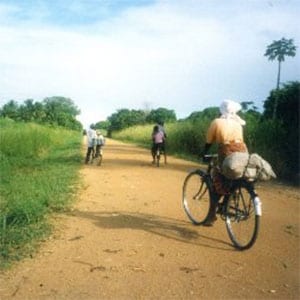
Be First to Comment